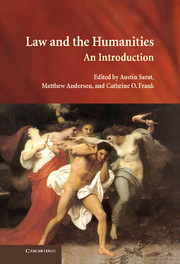Book contents
- Frontmatter
- Contents
- Contributors
- Acknowledgments
- Introduction: On the Origins and Prospects of the Humanistic Study of Law
- I PERSPECTIVES ON THE HISTORY AND SIGNIFICANCE OF SCHOLARSHIP IN LAW AND THE HUMANITIES: THREE VIEWS
- II IDEAS OF JUSTICE
- III IMAGINING THE LAW
- IV LINGUISTIC, LITERARY, AND CULTURAL PROCESSES IN LAW
- V INSTITUTIONAL PROCESSES
- 17 Trials
- 18 Testimony, Witnessing
- 19 Judgment in Law and the Humanities
- 20 Punishment
- Index
- References
19 - Judgment in Law and the Humanities
Published online by Cambridge University Press: 20 January 2010
- Frontmatter
- Contents
- Contributors
- Acknowledgments
- Introduction: On the Origins and Prospects of the Humanistic Study of Law
- I PERSPECTIVES ON THE HISTORY AND SIGNIFICANCE OF SCHOLARSHIP IN LAW AND THE HUMANITIES: THREE VIEWS
- II IDEAS OF JUSTICE
- III IMAGINING THE LAW
- IV LINGUISTIC, LITERARY, AND CULTURAL PROCESSES IN LAW
- V INSTITUTIONAL PROCESSES
- 17 Trials
- 18 Testimony, Witnessing
- 19 Judgment in Law and the Humanities
- 20 Punishment
- Index
- References
Summary
The interdisciplinary temperament of “Law and the Humanities” is both perplexing for law and intriguing for the humanities. This perplexity and this intrigue come to a head precisely over one of the most important institutional necessities and problems of law: judgment. If a text is not a truth but a debate; if it embodies not one story or meaning but many; if a statute, let us say, or a court case cannot be neatly separated from literature, or rhetoric, or politics – then there is literature, and rhetoric, and politics, in every interpretation and in every decision. A philosophical treatise can be subversive, open-ended, and speculative; a literary reading probably should be. A judge, however, must decide what this text means, whether this statute applies, who wins, who loses, and even sometimes, who lives and who dies. One of the central questions that the influence of the humanities on law raises is this: how, and with what legitimacy, can judgment take place if the texts on which judges base their decision do not – even in principle, let alone in practice – yield “one right answer.” The question of judgment becomes then a serious problem. It is a problem for positivists, of course, who entirely reject this approach to interpretation and meaning. It is no less a problem for scholars of the humanities in law, who have to try to find an answer to it if they wish to be relevant to legal institutions at all.
- Type
- Chapter
- Information
- Law and the HumanitiesAn Introduction, pp. 496 - 516Publisher: Cambridge University PressPrint publication year: 2009



